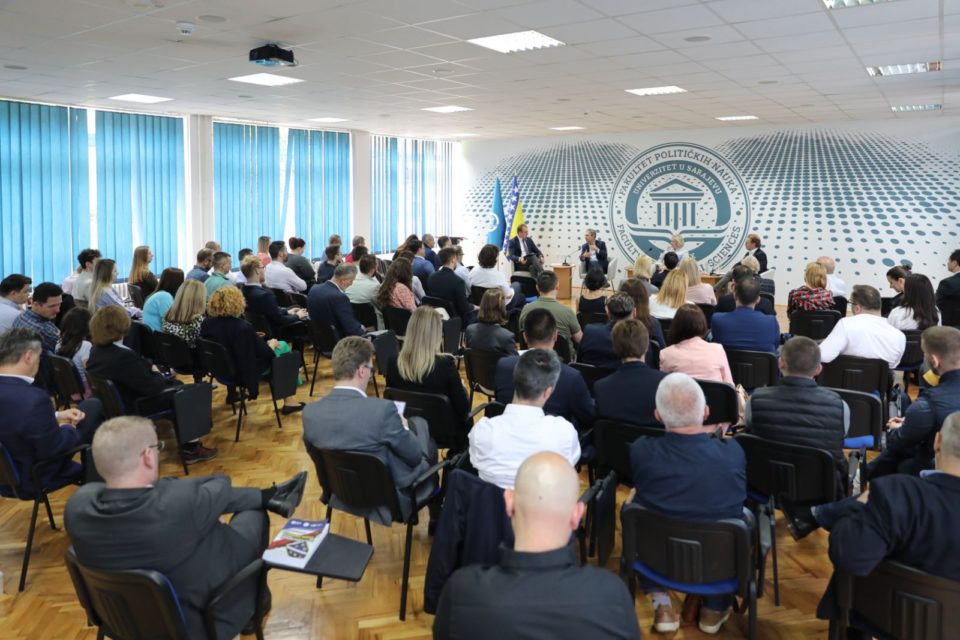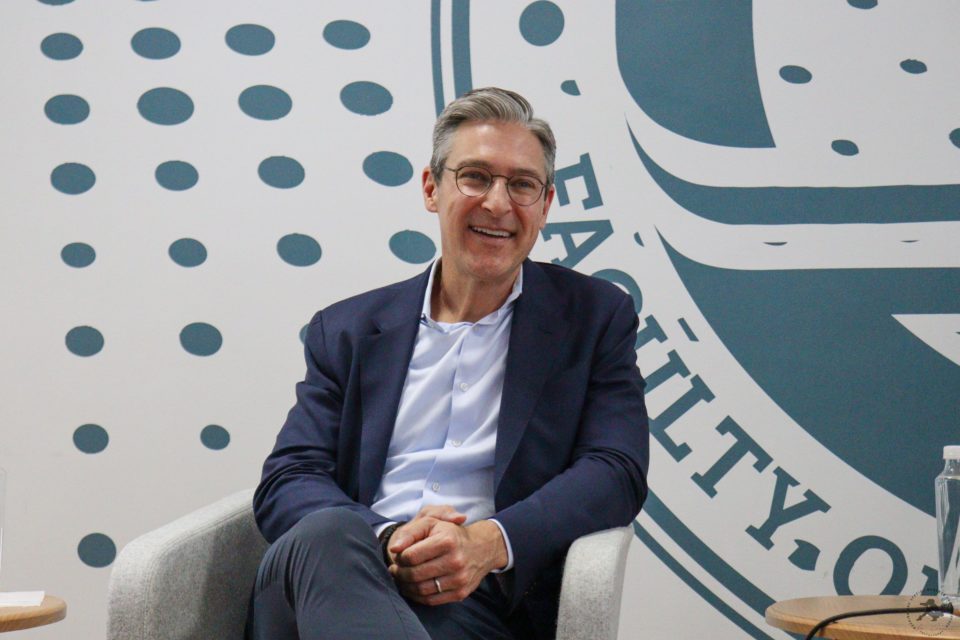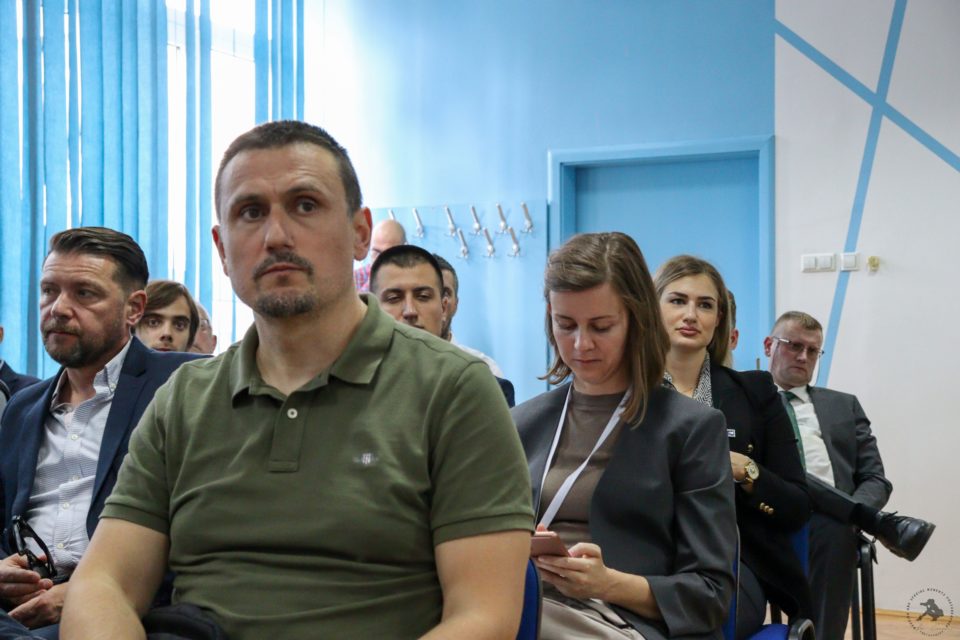
Last week, the University of Sarajevo’s Faculty of Political Science moderated a panel discussion on the challenges and opportunities faced by Bosnia and Herzegovina (BiH) within the Euro-Atlantic framework.
Moderated by the Dean of Faculty of Political Science, Sead Turčalo, the lively discussion covered a breadth of issues at the core of Bosnian democracy-building. From women fighting for peace, to the ever-mutating nexus of misinformation in the digital age, to the existential crisis facing Bosnian society and its allies, the panel did not shy away from the gritty details.
The panel was entitled “Geopolitical Challenges and Opportunities for Bosnia and Herzegovina within the Euro-Atlantic Framework”. Its panelists were Damon Wilson, the President and CEO of the nonprofit National Endowment for Democracy (NED), Ambassador Melanne Verveer, Executive Director of the Georgetown Institute for Women, Peace and Security at Georgetown University, and Congressman Peter Roskam, the six-term representative of Illinois and Vice-Chair of NED’s Board of Directors.
Hearing comments from two NED representatives was particularly poignant for the predominantly Bosnian audience. As NED President, Damon Wilson, reminded the room, it was thirty years ago when the democracy-building foundation gave its first grant to the people of Bosnia. Then, in the midst of the Bosnian War (1992-1995), the grant had been distributed to the Bosnian newspaper, Oslobođenje, to ensure that the people of Bosnia could continue telling the world their painful stories in their own words. Today, NED has over 140 initiatives in the region, partnering up with democracy advocates on the ground to assist them in building a democratic system that works for the local community.

Geopolitics was the broader topic of the day. However, questions were often oriented around the desperately sought democratic aspirations that a battered, yet resilient BiH continues to strive towards. Throughout the discussion, one message was echoed time and time again: BiH’s young generation must claim their agency to forge the future they want.
Damon Wilson’s Introductory Remarks: Reflecting on NED’s Legacy
Wilson opened the discussion with his own reflections on NED’s legacy in BiH.
Following 30 years of NED’s presence in BiH and the Western Balkans, he underlined the organisation’s commitment to assisting pro-democracy actors on the ground, while ensuring that local actors remain the central driving force of any initiatives.
Wilson also referenced his previous discussion with young Bosnians at the Sarajevo City Hall, for the TV series, Perspektiva. What struck him was the sentiment among his interlocutors that young people in BiH have inherited the problems of their parents’ (wartime) generation. Though many expressed a desire to stay in their homeland, the lack of economic prospects was, they say, forcing them to join the thousands of other young Bosnians in emigrating. In this bleak context of Bosnia’s brain-drain, he underscored the need to continue strengthening actors on the ground in BiH and beyond who seek to build a healthy democracy, transitional justice, and a culture of accountability.

NED’s array of initiatives in the region are a reminder of the organisation’s commitment to embolden the local civil society to forge the future they themselves demand. He reiterated that NED will continue fulfilling this assistant role, emphasising that the organisation’s ethos is to keep local actors centre-stage.
As Wilson reminded the audience, BiH’s long-term objectives are and will continue to be EU and NATO membership, as a safeguard of the country’s freedom. Against a backdrop of war in Gaza and Ukraine, he stressed that healthy democracies in the Western Balkans remains more important than ever.
Wilson’s introductory remarks finished on a hopeful note. The NED President argued that frustrations are healthy in any democratic system, so long as citizens channel their desire for change into material action. A defiant statement of confidence concluded his opening statement: every new generation graduating from the University of Sarajevo will claim their agency and fight for their values.
Panel Discussion: Women, Democracy, and Feeling the Pulse
Ambassador Melanne Verveer voiced her concerns about the limited progress made in terms of women’s political and economic empowerment. She reiterated that political and economic progress for women has not matched the progress made in other aspects of Bosnian society. To achieve this change, she argued for a change in norms and attitudes, away from deeply entrenched biases against women. Ambassador Verveer, who was the first US Ambassador for Global Women’s Issues under the Obama administration, set out a strategy for realising political and economic change for women. She argued that local actors can and should start by working with the local community at all levels. Once people understand the harm that gender-based biases and norms are inflicting upon women, these norms can slowly but surely change.
Ambassador Verveer expressed concern about the authoritarian turn unfolding across Europe and the US, referencing the recent attempts by the US Supreme Court to undermine women’s rights. Authoritarianism goes hand in hand with a reversion to so-called ‘traditional values’, which always harm women. In times of conflict, women’s bodies become battlefields for men. This is exemplified by the disproportionate number of cases of sexual violence against women in conflict, including the Bosnian War. Within this context, she argued passionately that the tools to empower women in post-conflict societies like BiH lie in their political and economic success. Ambassador Verveer named small and medium enterprises as a crucial pathway for women in BiH to flourish, while any democracy-building must centre women’s voices in its institutions. Democracy without the participation of women is, in her words, “not a democracy, but a contradiction”.
Congressman Peter Roskman spoke at length about the “episodic soul-searching” of the United States regarding the role it wishes to assume in the Western Balkans. Criticising both the far-left and the far-right for their eschewing of US influence in post-conflict regions, he stressed the need for consensus on the issue. If the US is to build a positive role in BiH’s democracy-building, US political actors must strive for bipartisan support. BiH has a lot to offer in terms of its resilience and success against all odds. The Congressman reiterated his hope to see the full potential of BiH conveyed to the US political establishment.
The panel discussion was enriched by Congressman Roskman’s reflections on the democratic legacy of the US Founding Fathers. He stressed that checks and balances were an essential part of the Founding Fathers’ vision for US democracy, which explains the often vilified US legislature and its complete reliance on consensus in order to pass laws. He connected the concept of consensus politics to democracy-building in BiH and beyond. Consensus, alongside checks and balances must be at the core of any movement seeking to build a healthy, robust democracy.
NED President, Damon Wilson, focused his comments on the organisation’s keen interest in “feeling the pulse” of Bosnian society. Wilson was clear in the following: the initiatives funded by NED are always a response to the demands of BiH’s civil society. Like the Oslobođenje grant in the 1990s, today’s projects are created by NED’s partners on the ground. Wilson echoed Ambassador Verveer’s interest in political and economic progress in BiH, insisting that these both go hand in hand with democracy-building, transitional justice, and a culture of accountability. To that end, Wilson reflected on the foreign agents’ law being that was to be debated by the Republika Srpska (RS) assembly. He lamented the arrival of this law to BiH’s political debate, stressing that not only is the law hypocritical given the foreign aid that the RS political establishment frequently seeks, but it also demonises the very independent actors who love their country enough to try to strengthen its democracy.
Final Questions: Democracy at Risk
The discussion was concluded by audience-member questions. These questions were characterised by profound concerns regarding the commitment of the US to democracy-building in Bosnia and Herzegovina, as well as global efforts to undermine the rules-based international order.

In response to the latter, the panelists echoed one another’s concerns. Ambassador Verveer sounded the alarm against a culture of misinformation that, she argued, dominates our society with alternative facts that undermine democratic institutions. Congressman Roskman concluded that in any debate, there may be “my perspective” and “your perspective”, but there can only be “one truth”. Damon Wilson emphasized that the rules-based international order can only be sustained if democracies around the world uphold it. Referencing war in the Middle East and Eastern Europe, Wilson concluded that citizens must claim their agency to demand that their institutions uphold rules-based values.
Nonetheless, all three panelists were unanimous in their reiteration that, regardless of who sits in the Oval Office, US commitments to BiH’s democracy shall remain steadfast. Speaking from a nonprofit perspective, the NED President emphasised that US civil society actors shall continue to act in the interest of BiH’s “sovereignty and territorial integrity”. Congressman Roskman echoed this, urging Bosnians to teach the world what they have learnt from their fight against radicalism.
The panel discussion was both timely and rich in its breadth of topics. What remains clear from the comments we heard, is that the people of Bosnia and Herzegovina and their allies will need to continue fighting for the democracy they want. If and when that new status quo is achieved, it will be theirs to cherish – only, as Benjamin Franklin warned in 1787, “if you can keep it”.





